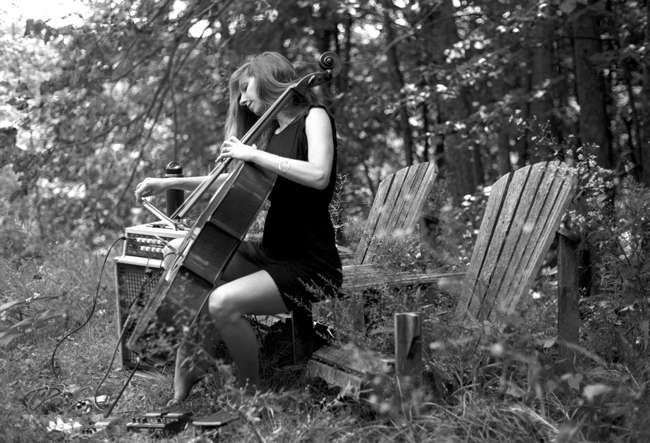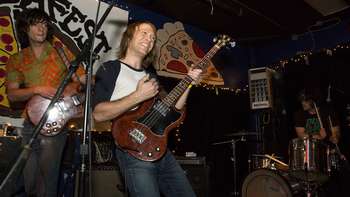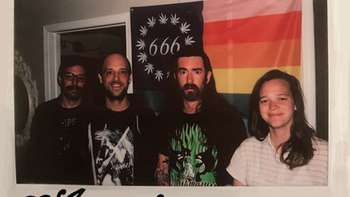Scene Point Blank: When did you decide to venture on your own with Saltland?
Rebecca Foon: I think I just really needed to challenge myself in new ways because I was playing with all these collectives and I was co-writing, and I used to do group singing. So I released the first Saltland album in 2013 and at that time I really needed to challenge myself to write songs in different ways and sing and write lyrics and see if I could sing on top of melodies that I wrote on the cello.
I did not really know what I was doing, but I needed to do something different to push myself artistically as a musician and see who I was a bit more. What could come out of me. I just needed to be intimate with myself and I was going through a lot of changes in my life and I had a lot of sadness I needed to get out, and a lot of frustrations about the world. And I was getting heavily involved in city work and city planning, and I just needed an outlet for it and I needed to write words.

Scene Point Blank: What is your relationship with writing?
Rebecca Foon: I come from a family of writers. So, I was always trying to stay away from writing because my parents are writers. [Laughs]. So, I thought I was just going to give myself permission to write and try to sing and see what my voice sounds like not in a group context.
Scene Point Blank: How different do you find when you are composing music on your own as opposed to a group setting?
Rebecca Foon: In a way it is similar. With Set Fires to Flames and Mt. Zion, a lot of the compositions come out organically through improvising and playing, and they just emerge. Esmerine is much more composed, while there is some music that emerges through improvisation, some stuff can be quite frustrating to be honest. Sometimes it feels like a lot of work and bumping your head against the wall to try to come up with something. [Laughs]. And then once you have and you learn it, it is really fun to play, but sometimes it can be more challenging.
For Saltland, for the lyrics I just have to discipline myself to just do it and I really enjoy writing. Then the actual music is a weird thing, and I just have to play using looper, and something might happen that is cool, but sometimes there is nothing cool coming up for a long time and then something interesting happens and you are like “Wooh, that is awesome.” “Light of Mercy” [from A Common Truth], that song is really weird, it just came out of me. I do not know why, but it came out really quickly and really easily while other songs took a long time to develop into what they are.
The title track is based more around strings and emerged through writing a bunch of cello parts and stacking them on top of each other. But it is also very much a track about climate change and so it is a heavy track, the lyrics are heavy and the theme of it is heavy.
Scene Point Blank: When did you write the tracks for the album?
Rebecca Foon: I wrote all these songs and developed the album in the lead up to the UN climate talks that happened in 2015 in Paris. I started a charity called Pathway to Paris with my partner Jesse Paris Smith and we organised two concerts in Paris during the UN climate talks. We were very heavily involved and really trying to highlight what was going on and the importance of establishing the Paris agreement.
Scene Point Blank: How did you feel about the procedure at that time?
Rebecca Foon: I was very worried actually that the Paris agreement was not going to come to fruition and the targets were going to be weaker than they actually were. It could be stronger of course, but I thought what actually happened was much better than what I thought was going to happen. So, I had a lot of anxiety and fear around it and fear because I also was pretty convinced that if the Paris agreement did not happen, we were pretty screwed. [Laughs]. It was worrying me too because I did not feel a lot of people were talking about it or even knew about it at that time. It shocked me that it was not a part of the conversations I was engaged in more.
Scene Point Blank: How would you describe the compositional changes between your debut and A Common Truth?
Rebecca Foon: I think my debut album is very interesting because I never tried something like that before. I never tried singing and playing cello, and it has more of an electronic element to it and it is a bit pop-ier. A bit more catchy maybe. When I made that first album I did not know I could sing, I did not know I could write songs, I just did not know that side of me.
For the new album I have given myself permission to dive in and be as true as possible. Tap into who I am and what I believe in, what I care about and musically what comes out of me when I tap into those elements. It is very much a soulful album, tapping into who I am as a person and expressing it creatively.
Scene Point Blank: It definitely feels like a more personal album.
Rebecca Foon: Yeah, it is a very personal album. It taps into very personal things like love and my inspirations, stories, intimate relationships I have. And deeply caring about the planet, biodiversity and the state of the world.
Scene Point Blank: One striking difference to me from your debut was that you did not include percussive elements. How did you come to that decision?
Rebecca Foon: You know that was more of a practical decision because I found the first album really hard to play live. I can only play half of it live successfully in my eyes. For the second album, I wanted to be able to perform that live solo, without relying on a drum machine or samplers. I just wanted to be able to play the cello and sing. Of course, when I do it live now, it is much more stripped down than the album, but I wanted to still be able to do it in a stripped down and intimate way that captivates the audience where I feel I can communicate myself in the same way I try to do with the album, tapping into something that feels honest and engaging.
Scene Point Blank: You also recorded again with Jace Lacek, who was also the engineer of the first record. How important is it to have someone behind the desk that knows your sound and how your music should be recorded?
Rebecca Foon: For me, part of it is the trust. I have done so many albums now with Jace with Esmerine, Saltland and film work. I really love the cello sound that he can get, and I trust the sound he can capture and then I also really love his creative ideas. Even though he is an engineer, he is basically a producer for me. I trust his ideas, and even if he does something that seems crazy I just let him go for it and then something amazing will happen. [Laughs]. Especially when I add some of my ideas [it becomes] a really fun collaborative relationship.
Scene Point Blank: Can you give an example of that from the new record?
Rebecca Foon: “I Only Wish This For You” was very collaborative. He contributed tons to that song. I never would have thought it would turn out the way it did, I thought it would be a very wacky song, and it ended up being the song that keeps getting played.
I really like working with him. The other thing is that I feel safe with him. I really feel like he has helped me become who I am. I can sing into a microphone and he can record it: for a song that is very intimate, and it feels safe. You have to feel so safe to do something like that and they are just not so many people that I can do that with. Maybe now I am more confident but I can just not worry and try out stuff like that, and you just have to feel so safe.
Scene Point Blank: Do you find it more difficult singing live or in the studio?
Rebecca Foon: Probably live, because there are so many factors at play with the monitors. The studio is such a controlled environment and it is kind of easier for me. The hardest for me is singing with other musicians, because I have a soft singing voice and my range is quite limited and I cannot sing super loudly. This is the other reason I wanted to do solo singing.








